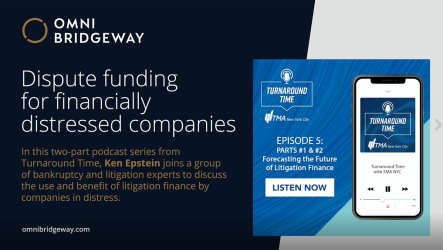Dispute funding for financially distressed companies

A financially distressed or insolvent company may not have the financial resources to adequately prosecute its legal claims. Nevertheless, these claims may be an important asset of the company, representing the only source of recovery to unsecured creditors should a bankruptcy filing occur.
Instead of letting these assets wither in the background, advisors to creditors and distressed companies should consider dispute resolution financing as an option. Increasingly, litigation funding is filling the gap left by traditional financing sources, providing critical liquidity to companies in need.
A recent, two-part episode of Turnaround Time, a podcast hosted by the Turnaround Management Association of New York City, examines the ways litigation funding can be used by financially distressed and insolvent companies. A group of bankruptcy and litigation funding experts explain the fundamentals of litigation finance, including the key considerations involved.
The podcast was moderated by David Prager, Managing Director in the disputes consulting practice of Duff & Phelps. David was joined by Tatiana Markel, a bankruptcy litigation partner in BakerHostetler’s New York City office, Howard Brownstein, President and CEO of the Brownstein Corporation, and Ken Epstein, Investment Manager and Legal Counsel at Omni Bridgeway.
In Part I of the Episode, the panelists discussed:
- The nature of litigation funding, including the types of financing available in disputes, and the kinds of cases in which funders invest.
- A funder’s ability to provide undercapitalized parties—such as a bankrupt estate or distressed company—with the financing to pursue claims against well-to-do opponents.
- The value of the funder’s due diligence process, which can help lawyers and clients assess the strength of their cases and legal strategies.
- Creative ways dispute financing is being used to purchase legal claims and judgments on appeal, and to provide working capital to companies with large potential recoveries.
- The nuts and bolts of litigation funding arrangements, including the process followed by the funder and its expected return on investment.
- Ethical considerations for funders and lawyers, including the handling of confidential information and privilege issues, and the present state of ethical rules impacting funding in key jurisdictions.
In Part II of the Episode, the panelists discussed:
- The nexus between litigation funding and bankruptcy cases and the types of cases that may be suitable for funding.
- How funding can allow distressed companies and insolvent estates to retain high-quality law firms, even when those firms that have historically been unwilling to take substantial risk on cases.
- A recent case that, in the words of one panelist, attempted to put the “square peg of litigation funding into the round hole of DIP financing” and how judges may react to this kind of funding scenario.
- Issues of transparency and disclosure and how funding companies may need to evolve as they increase their assistance to insolvent entities.
You can find the entirety of this podcast discussion in Episode 5 of the Turnaround Time podcast.
And to learn more about how litigation finance can work for distressed or bankrupt companies, visit our Company Insights. While there, explore our recent podcasts, blog posts, and videos. Or contact us for a consultation to learn more about the ways we can help you pursue meritorious claims.